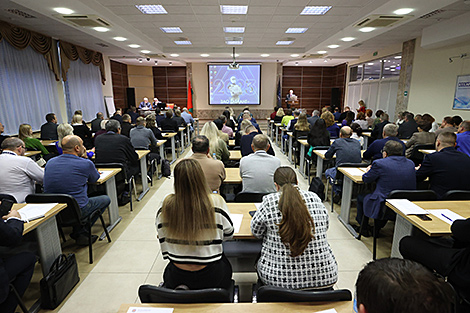Business news
Call on Belarusian companies to protect domestic market, defend interests on foreign ones

MINSK, 9 November (BelTA) - Belarusian enterprises need to use instruments to protect the domestic market more widely, Belarusian Deputy Minister of Foreign Affairs Igor Nazaruk said at a seminar for Belarusian enterprises on the application of measures to protect the domestic market and measures of customs and tariff regulation in the Eurasian Economic Union, BelTA has learned.
According to the deputy minister, under the conditions when it is necessary to find new markets, enter new countries and conquer additional niches, Belarusian enterprises face aggressive behavior of their competitors.
“Recently, we have been receiving signals of increased competition from manufacturers of specific regions. This pertains to the machine-building complex, household appliances, fiberglass, and other goods. The question arises as to how to use the permitted, legitimate tools to overcome these obstacles, how to protect our market taking into account Belarus' participation in the supranational structure [EAEU]. If we talk about protective investigations, we have not yet taken decisive steps in this direction with regard to imports from third countries, despite the declared interest of our producers. We are Belarus as a whole,” Igor Nazaruk said.
But this was not always the case, the representative of the ministry said. Until 2011 investigations were in the national competence, or, to be more precise, in the competence of the Ministry of Foreign Affairs.
From 2001 to 2010, Belarusian enterprises together with the Ministry of Foreign Affairs initiated 15 protective investigations, including ten special protection and five anti-dumping investigations. As a result of these investigations, five protective measures were introduced, including four special protective measures and one anti-dumping duty.
However, after 2011, when investigations were transferred to the supranational competence, i.e. to the Eurasian Economic Commission, Belarusian enterprises did not initiate any investigations. Belarusian producers are quite willing to join investigations initiated by producers from other EAEU countries.
According to Igor Nazaruk, on the one hand this can be explained by the fact that in order to initiate an investigation it is necessary to comply with the requirement on the share of production. The applicant and the EAEU producers who spoke in favor of the application must produce at least 25% of the total production in the territory of the union. On the other hand, however, even when Belarusian producers are aware that they will be supported by producers from other EAEU states in case of filing an application, they still do not dare to prepare an application on their own.
“Many foreign enterprises resort to dumping. Their goal is self-interest, to conquer the market, to displace competitors, producers in the country and further dominate this market. They sell goods at a cost that is lower than the cost of production and transportation. The enterprise goes to such costs, realizing that further, having conquered this market, they will gradually or sharply increase the cost of their goods or services, work off the costs and further work with profit. Difficult times are coming for an enterprise that enters into competition with a foreigner. We will advise our enterprises how to act in the new difficult conditions,” the representative of the ministry said.
The seminar has been organized by the Belarusian Ministry of Foreign Affairs jointly with the Eurasian Economic Commission at the Atlant enterprise. Attending it are representatives of more than 70 Belarusian enterprises. Last year, a similar event was organized in the format of a video link.
Belarusian commodity producers will be briefed on the details in preparing initiative proposals in customs tariff regulation and applications for protective investigations. The event will also address issues related to temporary reduction of import duty rates of the unified customs tariff and application of tariff benefits to reduce the cost of raw materials that are not produced in the EAEU and belong to the category of critical import goods.







 print version
print version make home page
make home page add to bookmarks
add to bookmarks

